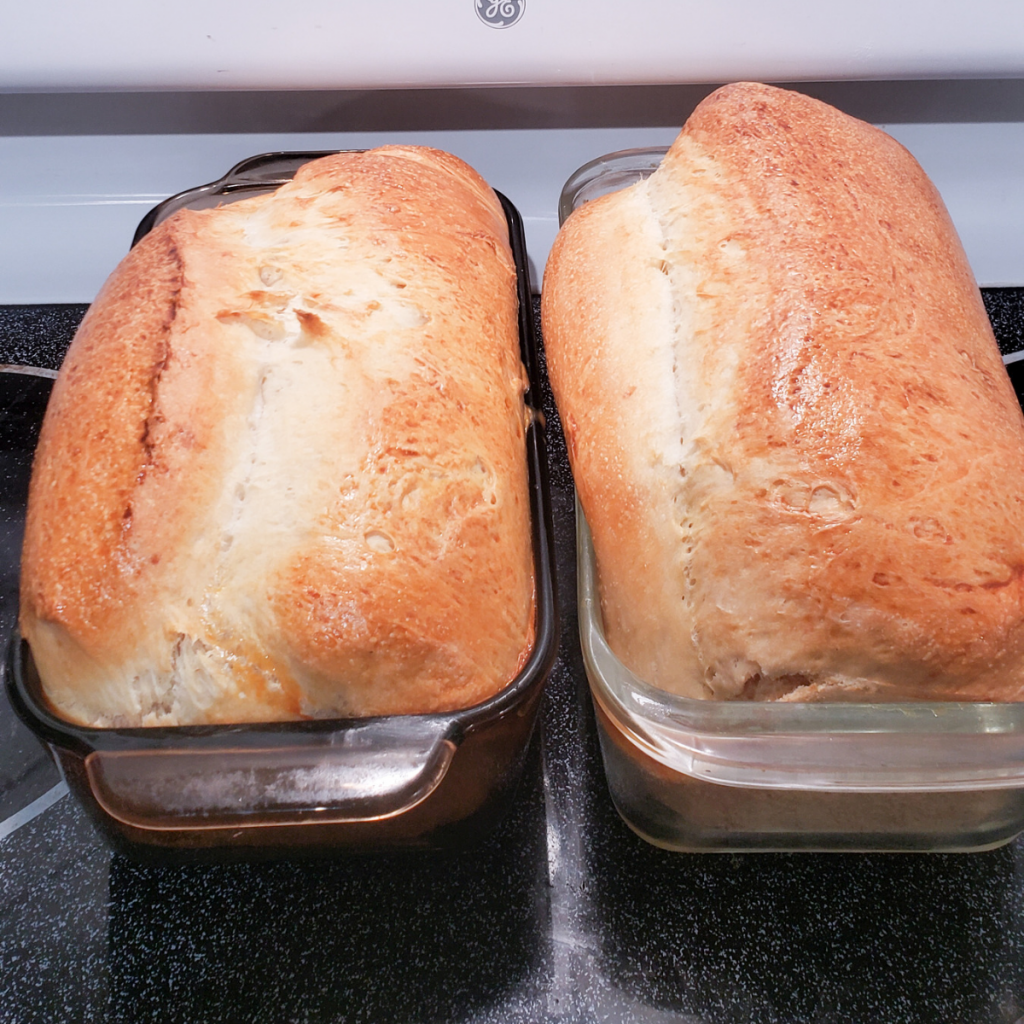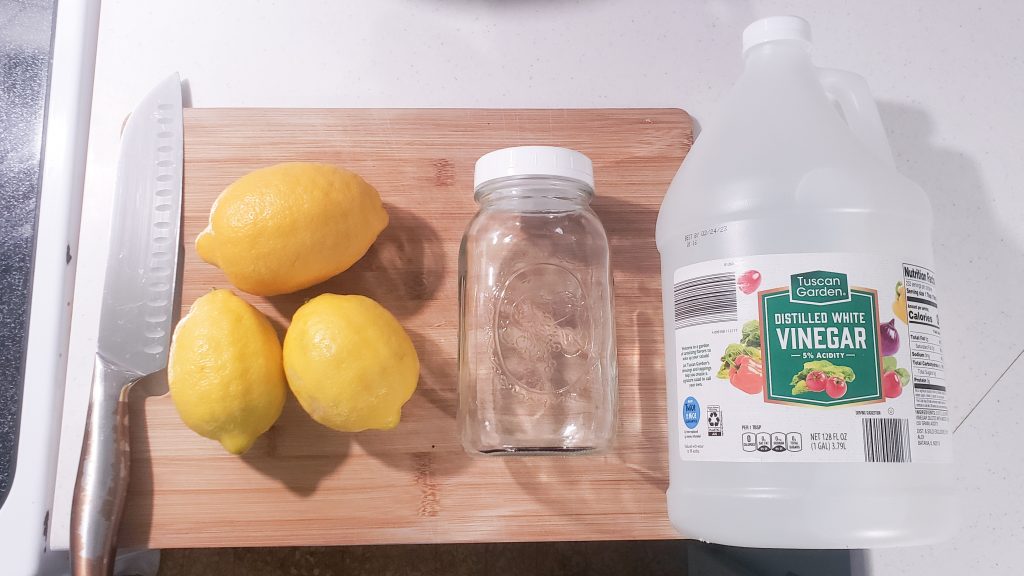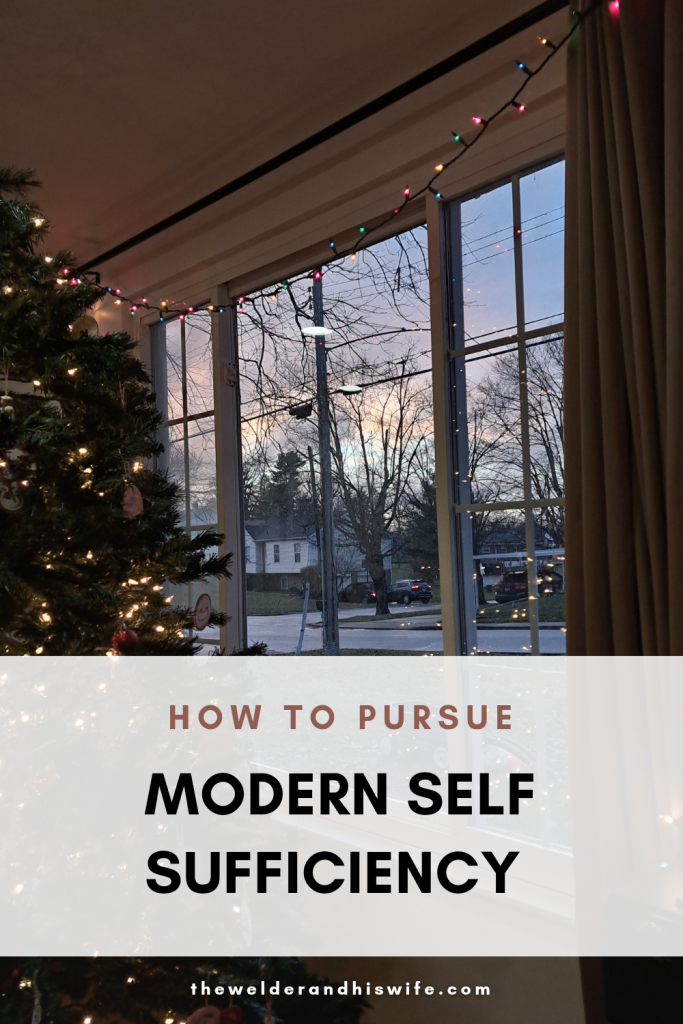I used to wonder “how can a modern family pursue self sufficiency?” Through trial and error, I’ve learned what modern self sufficiency is and how anyone in any position can pursue it.

What is modern self sufficiency?
The short answer that still took me quite some time to find, is that modern self sufficiency is all a matter of degree. It comes down to your degree of ability to be self sustainable, but even more importantly, your degree of interest in being self sustainable.
Being self sustaining can encompass as much or as little as you want it to. From producing your own food and living off the land, to foraging and stocking your own medicine cabinet, to homeschooling, to making your own clothes, to living off grid without electricity and standard plumbing. Does everyone pursuing self sufficiency want all these things? Definitely not! The beauty is that you get to pick what degree of self sustainability you’re after.
While there are people out there pursuing all of these things (more power to them!), the vast majority of people who say they are looking to nurture modern self sufficiency in their lifestyles are pursuing it on a smaller scale.
Degrees of modern self sufficiency
What can these degrees look like for people with limited resources or limited interest?
Self sufficiency can simply mean that you make all your own food so that you can enjoy the health benefits of food that hasn’t been extremely processed through the US food system. Even this can be broken into levels.
Maybe you shop at farmer’s markets and plan seasonal meal plans. Maybe you grow some of your own vegetables and fruits or have laying hens so you have even more control of where your food comes from. Maybe you mill your own grains and bake your own breads too. Any and all of these practices are a degree of self sufficiency, and whichever level you’re on is valuable!
Maybe modern self sufficiency means fighting consumerism and cutting back to a more handmade, simplified life. Maybe you only buy sustainably produced products, or you fix, repair, or upcycle your damaged or worn possessions. Maybe you adhere to a more minimalist home, or are actually beginning to make the things you use. You’re building furniture or sewing clothing. Any of these steps are beneficial and worthwhile.
Maybe you’re aiming more at being a “prepper” so that you’re ready for what life and the world throw at you. Maybe that only means keeping track of your finances and budgeting wisely so that when things go wrong you can afford to pay for them to be fixed, or pay for help. Or maybe you’re storing up non-perishables, canning food, and developing a personal “warehouse” and installing solar panels. No matter what, it’s all progress!
Modern self sufficiency could mean you just want to know “how” on all the things Grandma used to do for herself but even our parents never learned. There are so many skills falling by the wayside. Even if they aren’t things you want to (or need to) be able to do every day, learning the skills so that you could do them if need be is an excellent idea. From using a sewing machine, to baking bread, to milking a cow, to knowing which plants are poisonous and which are edible, the list of skills you could learn “for emergencies” is limitless.

How to choose a form of modern self sufficiency that works for you
They key is “that works for you.” If you don’t have the land for it, trying to raise livestock is not an option for you. If you are allergic to gluten then standard bread baking might not be for you. If you just don’t have any desire to learn to change your oil and do car mechanics yourself, then don’t do it.
Ask yourself these questions:
- What are my needs? Where am I the least sufficient? What would be my greatest difficulty in an emergency situation? What would I suffer most without?
- What are my interests? What strengths do I have that I can grow from?
- What do I have the time and money to pursue? What resources do I have to learn?
- What can I do without overwhelming myself and giving up?
Avoiding overwhelm in modern self sufficiency
The best way to avoid being overwhelmed by undertaking too much, is to really answer those questions honestly and see where they take you. Choose one big things to pursue for a longer time period, even a year or more, before adding in more. This way the new skill can become second nature and it won’t feel like learning too much at a time when you choose to take on a new skill.
Another way to avoid becoming overwhelmed is to learn and grow as a community. This can mean grabbing a friend to learn with you to motivate you and hold you accountable. A spouse or a child who has a similar interest can be that community. Even a larger group like a class or a club or just a group of friends that has the same needs or interests and abilities can be ideal. A family is a community, so maybe your grandma and your mom all want to learn canning or sewing with you. Use the resource of people, both to learn with and to learn from. Just like traditional self sufficiency, modern self sufficiency involves community. It’s even more accessible now.
Also it’s great to remember that if you start something and you really don’t want to continue doing that thing or learning that skill, it is okay to stop. Nobody is forcing you to live differently than what you are willing to pursue. If you bought a pressure canner but hate canning, pass it on to a friend or sell it to someone who needs one. If you know you will never grow a garden after this year, there are materials you can pass to the next person. Don’t think of it as quitting, think of it as learning to be selective with your energy and attention. Bonus points for giving materials to someone who also wants to start out!
Give yourself the freedom to enjoy the process, and I can guarantee that anyone can find a degree of modern self sufficiency that they can stick with, enjoy, and pass on to friend and family!

